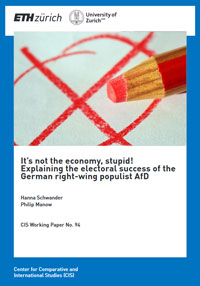
Right-wing populism is on the rise. Everywhere? Until recently, the resilience of the German party system to such a party has been an exception to this general trend. The establishment of the Alternative für Deutschland (AfD) in the wake of the Eurozone crisis put an end to this German exceptionalism.
This paper tests the 'losers of modernization'-thesis, one of the most dominant explanations for right-wing populist voting, for the case of the AfD. Based on district level data from the Federal Institute for Research on Building, Urban Affairs and Spatial Development and official data on electoral outcomes at the district level, we examine whether the socio-economic characteristics of a district yield any explanatory power for the AfD’s electoral success in the federal elections of 2013 and the elections to the European Parliament in 2014. With this data, we avoid problems of representativeness and reliability of survey data with respect to socio-economically marginalized groups and their voting behavior. Our findings suggest that the modernization thesis bears little relevance for the success of the populist right in Germany. By contrast, we find a strong correlation between the AfD’s electoral success in a district and the success of radical right parties in previous elections in the same district. We explain this intriguing finding with a "tradition of radical right voting" and a specific political culture on which the AfD has been able to draw once the broader political and social context allowed for the creation of a right-wing populist party in Germany.
More information:
Study: It’s not the economy, stupid! Explaining the electoral success of the German right-wing populist AfD
Contact:
Prof. Dr. Philip Manow











